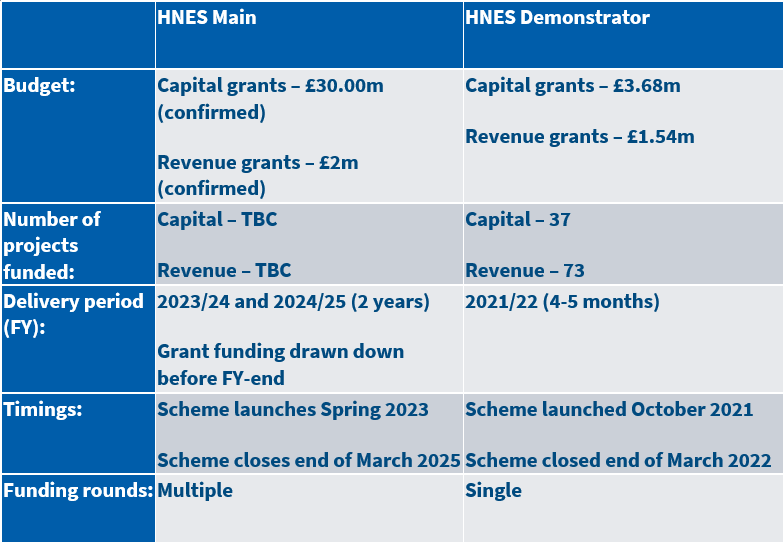Improving the efficiency of your heat network has never been more important. With unprecedented gas price rises, impending regulation, and net zero targets, heat network efficiency has never been such a hot topic for heat network operators, and for the Government.
In 2018, a study by the Competition and Markets Authority (CMA) found that although heat networks provide customers with a cost effective, efficient supply of heat compared to alternatives, some customers experience poorer outcomes in terms of price and service.
In response, the Heat Network Efficiency Scheme (HNES) was developed by the Department for Business, Energy & Industrial Strategy (BEIS), aimed at helping heat network owners and operators to support residents through better performing heat networks.
The HNES provides funding to heat network operators with existing heat networks or communal heating projects, enabling them to examine the performance of their network and make informed improvements where required.
Why is heat network efficiency so important?
The efficiency of your heat network is the crux of effective operation. Before the energy crisis and regulatory requirements, heat network efficiency was often seen by operators as a ‘nice to have’, rather than a necessity, despite significant cost saving benefits to both residents and operators.
There are many reasons why heat network efficiency is important. Firstly, good heat network efficiency means a better experience for residents on the scheme and brand protection for clients. An efficient network will lead to less outages and better reliability, meaning reduced complaints and less bad press.
Heat network efficiency also plays a key part in reducing costs, as poor efficiency results in a higher demand on the system. At a time where gas prices are at record highs, operators need to do everything possible to mitigate the rising cost of gas and the subsequent rise in resident tariffs. Improving efficiency can be one of the ways to mitigate this cost increase.
Finally, like a well serviced car, an efficient, well-maintained system breaks becomes more reliable. Effective and efficient operation of your heat network can improve the life of plant equipment significantly, due to the fact that it is being operated to its optimum performance.
Evidence from the demonstration round of HNES suggest that there are many heat networks out there that are not run well as far as efficiency goes. This is something the industry needs to address, as there is a history in the UK of not running heating systems for best efficiency, as the CIBSE CP1 states (on page 135) something of a cultural shift is needed to fix this. We recommend you start by employing specialist heat network maintenance companies that treat the heat network as a whole and use meter data to prioritise their maintenance activities.
Can I still apply for funding through the HNES?
The demonstrator round of HNES funding was very successful with a number of schemes being funded for improvements. The Heat Network Efficiency Scheme (HNES) Main scheme opens in February 2023 and this will differ from the initial demonstrator round. In the HNES Main, operators will be able to apply for 100% funding for Optimisation studies, or up to 50% funding for capital works which will mean the key objectives of the scheme which are to reduce carbon emissions, making heat networks more efficient, reduce customer detriment to improve consumer confidence and prepare the heat network market for sector regulation and technical standards.

Source: Department for Business, Energy & Industrial Strategy (BEIS)
Key takeaways
The efficiency of heat networks is of paramount importance to operators and residents, particularly in the current energy climate. Here are a few things heat network operators need to think about: If you have an existing heat network and you're concerned about its performance, talk to us to find out how we can support you.
- Heat Network (Metering and Billing) Regulations come into force from 1 September 2022. Operators will need to ensure that they are compliant, and the installation of heat meters is an important step on the journey to efficiency
- Heat network operators need to prepare for the next round of funding. Although the temptation may be to wait for the 100% funding for the Optimisation studies, the pot for capital works is limited. If you are struggling with poor efficiency, make sure you’re ahead of the game to ensure you get your application in early enough to benefit from the 50% capital funding.
- Poor performance of your heat network might be down to ineffective operations and maintenance (O&M). Speak to your current provider to ask how you can work together to improve efficiency or consider appointing a specialist O&M provider.
- The gas crisis has pushed heat network efficiency to the forefront. As a result of the exponential increases, paybacks on specialist maintenance and remedial works are much more attractive than pre-energy crisis and can make a significant different to resident tariffs.
- Look to start employing specialist heat network maintenance contractors.
If you have an existing heat network and you're concerned about its performance, talk to us to find out how we can support you.


